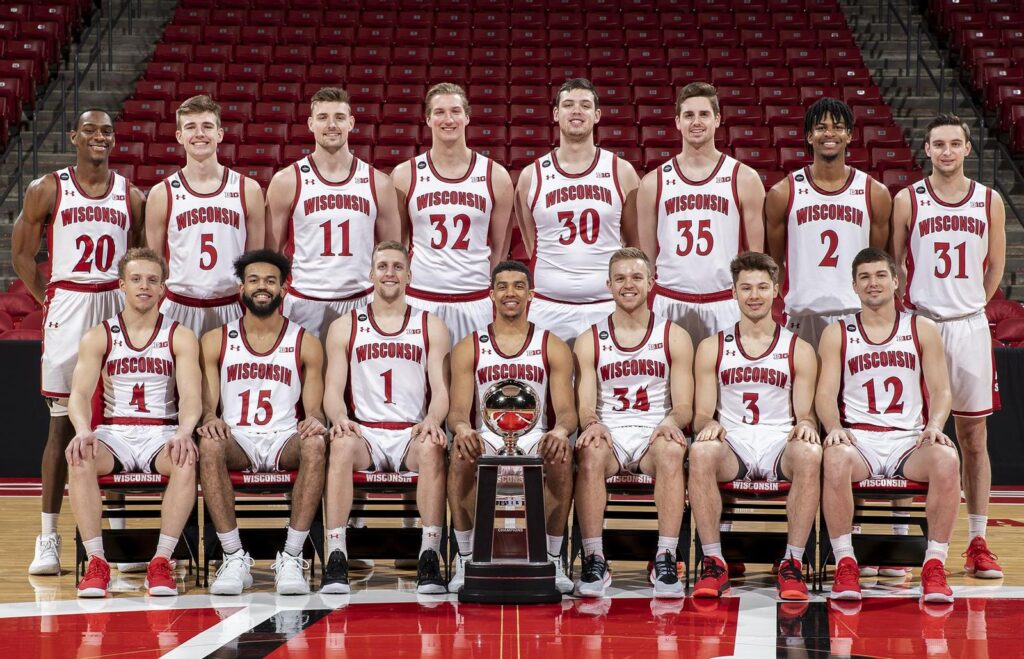Team History
The Wisconsin Badgers men’s basketball program boasts a legacy dating back over a century. Their rich history is interwoven with periods of dominance, rebuilding, and an unwavering commitment to on-court tenacity. The Badgers have consistently proven themselves as a formidable force in the Big Ten Conference and on the national stage, leaving their mark on the world of college basketball.
While their early history was marked by both promise and inconsistency, the Badgers have solidified themselves as a perennial contender in recent decades. Their unwavering dedication to the fundamentals, defensive prowess, and team-oriented playstyles have made them a tough opponent for any team in the country.
Foundation and Early Years
The Wisconsin Badgers program officially launched in 1898, although records suggest games were played as early as 1892. These formative years saw a young team battling hard to find its footing amidst a burgeoning Midwest basketball scene. The Badgers faced tough regional opponents and gradually developed their playing style, one that came to emphasize defensive grit and fundamentally sound play.
Despite growing pains, those early Badger teams laid the foundation for future success. The program found a passionate local following, setting the stage for the electric crowds that would fill the Kohl Center many years later.
Notable Early Achievements
While national titles remained elusive during its first few decades, the Badgers began to make their presence felt within the Western Conference (the precursor to the Big Ten). They clinched their first conference title in 1907 and continued to earn multiple conference championships throughout the 1910s and 1920s. Players like Walter Meanwell emerged as early Badger stars, laying the groundwork for the program’s future success.
These early achievements established the Badgers as a force within their region. They proved they could compete with the best, foreshadowing the national success they would achieve in the decades to come.
Periods of Change
Like many college programs, the Badgers had to navigate fluctuations in their fortunes. From the 1930s through the 1950s, the team endured stretches of inconsistency. However, a turning point arrived with the hiring of legendary coaches like Harold E. “Bud” Foster and John Erickson, who helped rebuild the program’s winning ways. Their influence led to renewed success and set the stage for the Badgers’ next era.
The years following Foster and Erickson saw the Badgers adapt their playing style to fit the evolving landscape of college basketball. Despite periods of ups and downs, they solidified their reputation as a defensively-minded program, a characteristic that persists to this day.
Championships and Achievements
The 1941 season was a watershed moment when the Wisconsin Badgers captured their first NCAA National Championship title. In the early 2000s, under charismatic coach Bo Ryan, the Badgers returned to national prominence. This period was marked by a remarkable string of NCAA Tournament appearances, several Sweet Sixteen and Elite Eight runs, and two Final Four appearances in 2014 and 2015. More recently, the team has won a share of the Big Ten regular-season title in 2020.
These championship-caliber seasons have cemented the Wisconsin Badgers’ place among college basketball’s elite. Their ability to consistently reach the top tiers of competition speaks to the program’s resilience and focus on long-term excellence.
Current Roster
The current Wisconsin Badgers roster features a balanced mix of both experienced veterans and exciting young talent. The squad is led by players known for their scoring prowess, their defensive intensity, and their ability to create opportunities for teammates. The Badgers consistently showcase the grit and team-oriented approach that has become a hallmark of the program.
This season’s roster reflects the program’s ability to attract top-tier recruits while consistently developing players within their system. The blend of experience and youthful energy promises both immediate success and the potential for sustained excellence in the years to come.
Management and Coaching Staff
Wisconsin is led by Head Coach, who brings a wealth of experience and a proven track record of success. He is supported by a dedicated coaching staff comprising assistant coaches, player development experts, and an analyst team. Their focus on player development, both individually and within the team dynamic, creates a strong support system that maximizes the team’s potential.
The Badgers’ coaching staff is highly respected for its emphasis on tactical awareness, skill development, and fostering a competitive spirit. They are committed to not only winning games but also instilling strong values and leadership qualities in their players.
Home Stadium Information
The Wisconsin Badgers play their home games at the iconic Kohl Center, located on the University of Wisconsin-Madison campus. The Kohl Center, opened in 1998, has a capacity exceeding 17,000, creating an electric atmosphere known for its passionate fan base. The arena is considered one of the most challenging places for visiting teams to play, with the roar of Badger fans providing a distinct home-court advantage.
Beyond its imposing size, the Kohl Center is equipped with state-of-the-art facilities for both players and spectators. The arena boasts modern amenities, comfortable seating, and an energetic environment that adds an extra dimension to every Badgers’ home game.
-
*********** ***** ******* *** ***** ** ************ **** ********* *****dd.mm.yyyy 00:00 PM
-
****** *********** **** ** ***** ****** *** **** *** ******: ********* *** ******* *** ****'* ****dd.mm.yyyy 00:00 PM
-
*********-***** ********: **** 6 **** *** ***** *** * ********* **** 7dd.mm.yyyy 00:00 PM
-
**********-************ *******: ****** ****ć, ******* *******, *** * ********* ********** ********dd.mm.yyyy 00:00 PM
-
********* **** ********* ** *** ***: ********* *** ********* ** ****** ******** **. *** *** *****dd.mm.yyyy 00:00 PM
-
****************** ******* **********: *** ********' **** ****dd.mm.yyyy 00:00 PM







